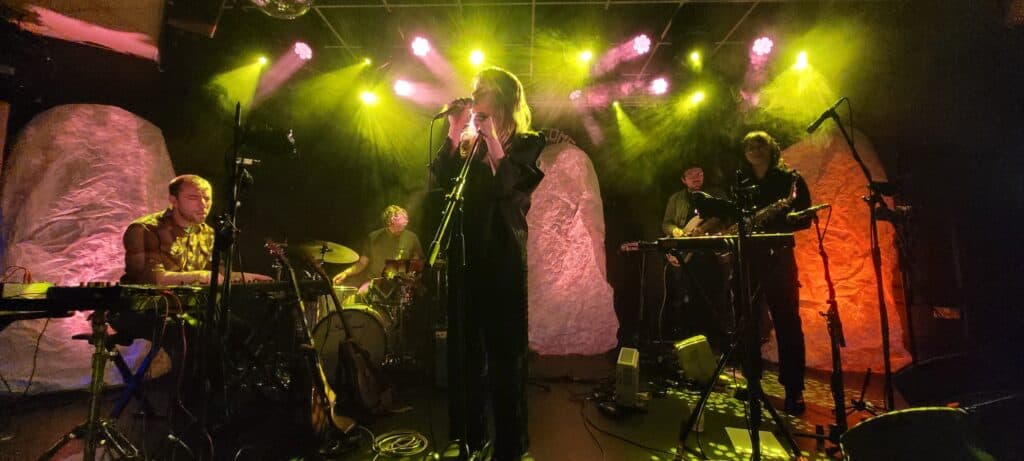Words: Callie Petch
“My Mum came to the London show last night and said to me, ‘Bonnie, I’m not sure how to say this but your crowd has a certain vibe…’ and I replied, ‘yeah, Mum, they’re all gay.” Bonnie Kemplay knows her primary fanbase, all three bands on the bill tonight do. Not to say that every person here in the Albert Hall is a queer/lesbian, but I am saying that you can hear the ‘first of all, how dare you’ winces when Kemplay continues riffing on the zoomer lesbian stereotypes mid-set whilst tuning her guitar. Something about romantically heartbroken indie pop which conjures wistful drivetime radio nostalgia really hits different for us queers, I dunno what to tell you. Play something like that and 2,290 people will flock to the Albert Hall like it’s a siren’s song, selling out the venue to cap off The Japanese House’s biggest headline tour yet.
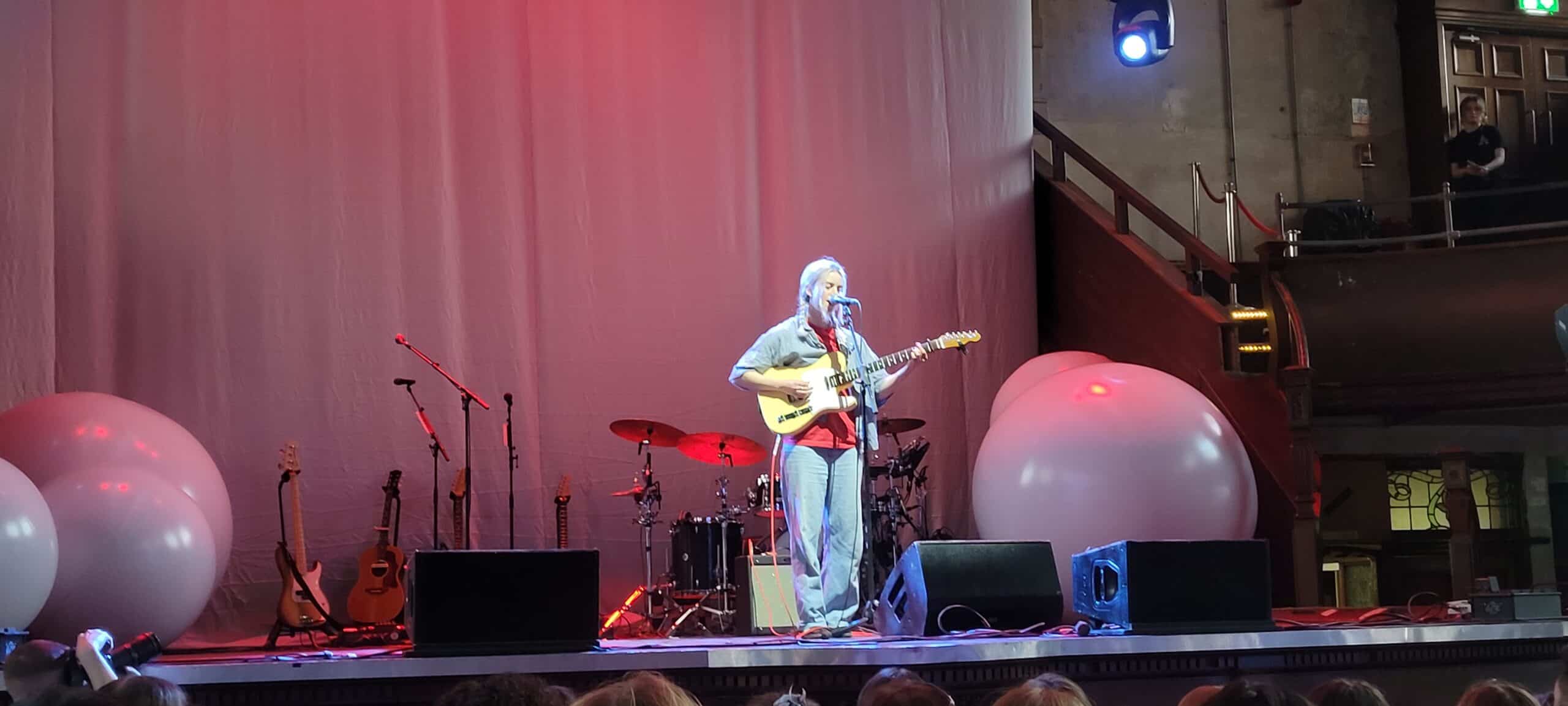
Credit: Callie Petch.
Kemplay, for her part, is second on the bill and suffering a tad from the unlucky position of following another low-tempo acoustic singer-songwriter set, and the crowd antsy-ly want to hear something a bit fuller. There are no heckles or rude interruptions but, from where I’m standing (on the floor near-centre about a third of the way from stage), there is an audible hum of mass conversation throughout much of her set that threatens to completely drown out her soft folky vocals. It’s not a bad set, to be clear. Unreleased new song “Katy” stretches its legs as Kemplay details a Primavera trip gone wrong, “Checkers” remains the kind of aching bedroom ballad designed for putting on mixtapes to share with your best friend, and her between-song banter is jovial. She’s just put in a bad spot here and some of these songs, like dreamy closer “Blushing,” arguably require the additional instrumentation that’s not financially feasible for a solo opener to stand out. Near the end of the set, she pulls out a cover of Adrianne Lenker’s recently-released “Fool” and I want it on record that I appreciate the song choice even if nobody else really does.
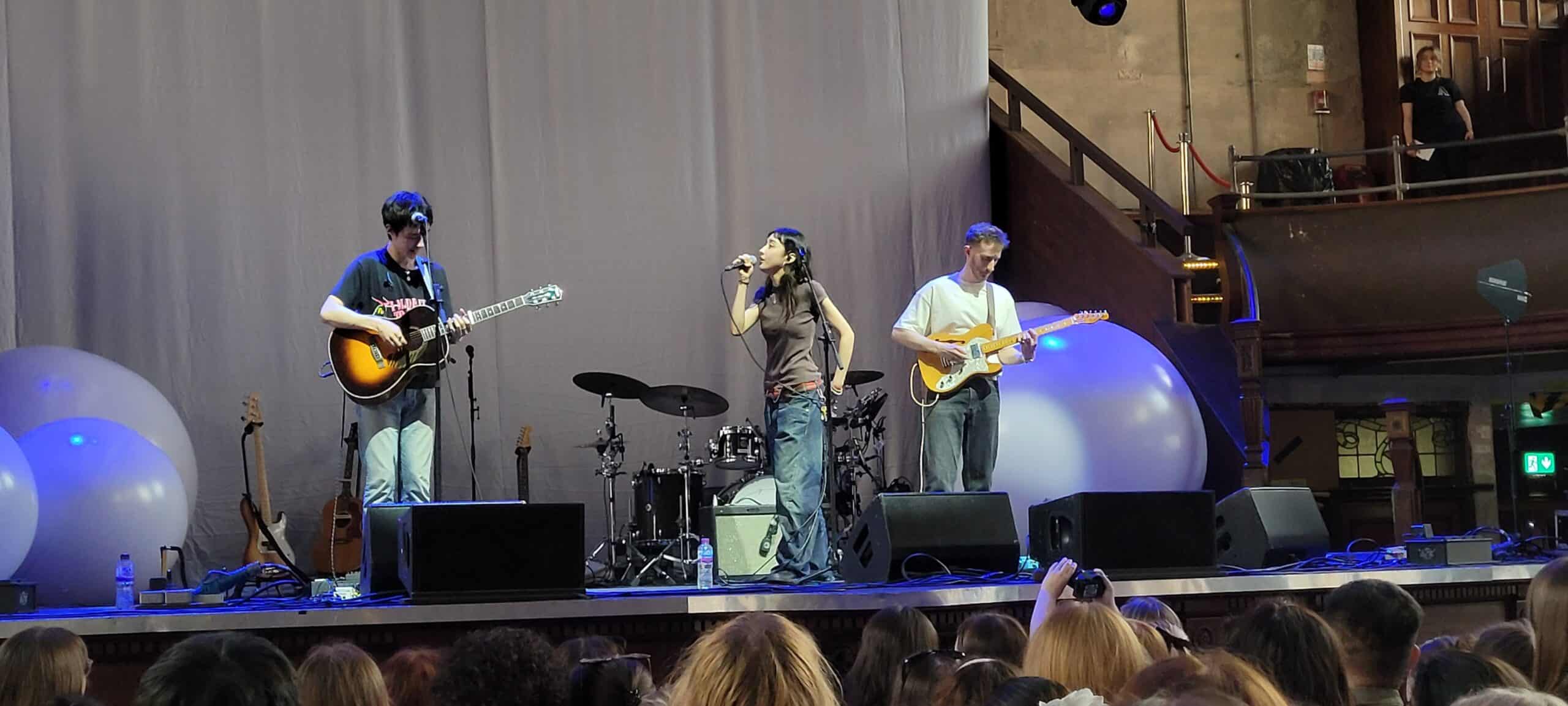
Credit: Callie Petch.
To some degree, Kemplay simply has her thunder unintentionally stolen by Esme Emerson, who play their own set about 40 minutes earlier. The sibling duo, joined by an additional guitarist who is often mixed so low as to be near-inaudible, are all-in on claiming their own slice of the late-90s/early-00s pop-rock revival with the kinds of achingly earnest and sickly-sweet, acoustic-led, slickly-produced numbers that’d fit right in on a Dawson’s Creek montage. The pair even look and perform like they’re ready for a slot on Total Request Live between Avril Lavigne and O-Town. Whilst this all reads like the meanest burns imaginable, I am also precisely the age (and sexual + gender orientation) to get a kick out of much of this, and certain pockets of the crowd are really vibing to the whole set. One pair of audience members even have their arms waving along in the air to recent single “Show You (Truck Song)” like it’s Natasha Bedingfield’s “Unwritten.” Some of the tracks bleed into each other in this stripped-down format, Esme on lead vocals and Emerson on primarily acoustic guitar, but the bones of solid pop songwriting are there that I imagine the more fleshed-out production on their upcoming EP will render more distinct.
Then, to the main event. Something ineffable yet vital seemed to click with The Japanese House’s sophomore album, In the End it Always Does, last year. Amber Bain spent much of the 2010s as an artist to watch, releasing a string of atmospheric, cinematic EPs and a solid as hell synthpop-inflected debut album, Good at Falling, in 2019. These set out her stall as an artist intent on finding the middle of a bridge between the organic and the synthetic; luscious swimming electronics and heavily-processed vocals which coat bubbly pop-rock guitar riffs and melancholic lyrics of queer longing. From her initial semi-anonymous arrival in 2015 through to the Bon Iver-assisted 2020 EP, Chewing Cotton Wool, Bain pretty much never stopped releasing music. The near-three-year gap between Wool and In the End was the longest she’d gone without dropping a new project.
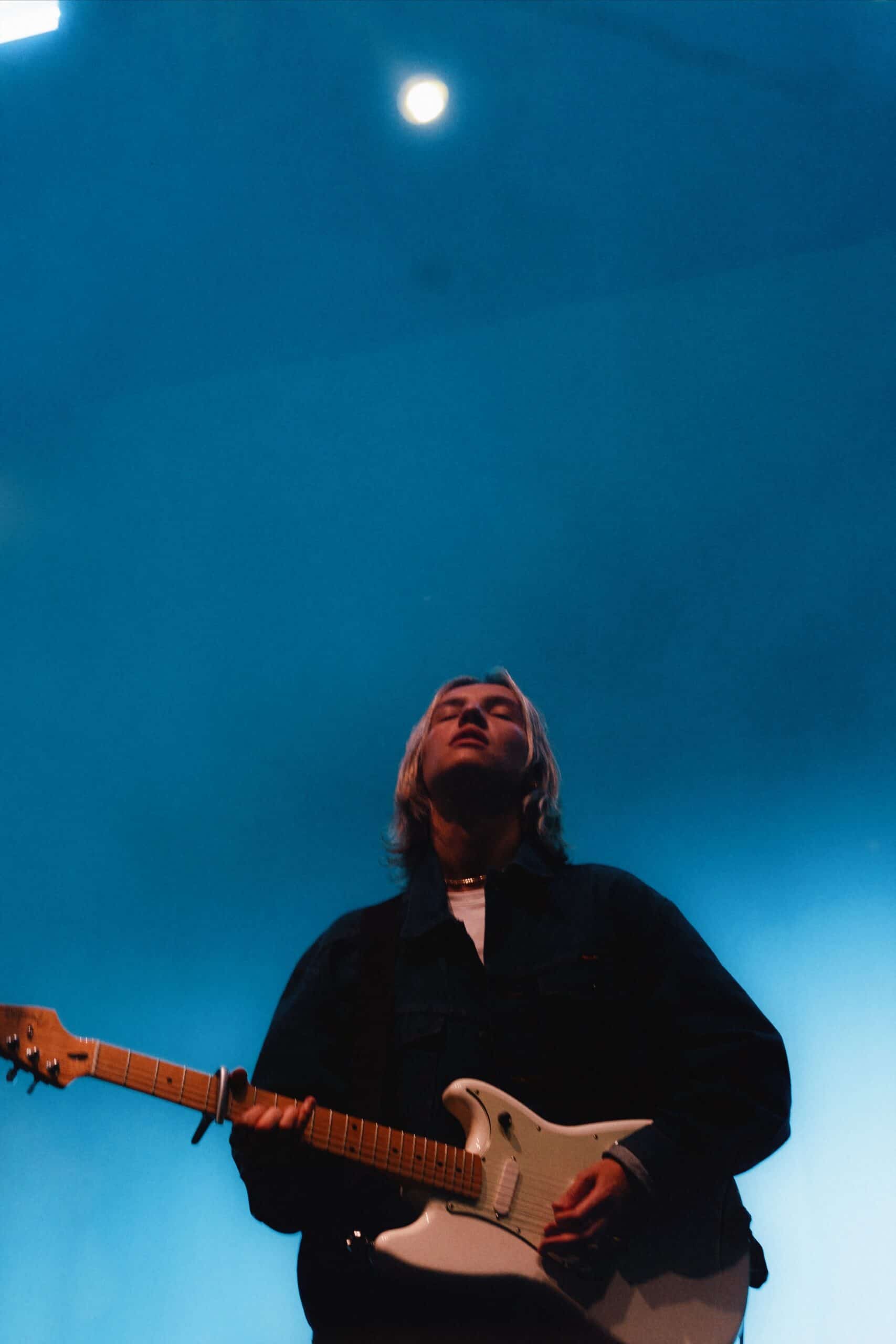
Credit: Emie Grimwood via @emiescamera (IG).
Maybe that time off was what ended up making In the End it Always Does one of the best albums of 2023. Sharper hooks, a better balance of the pop and ambient sides of her musical identity, George Daniel and Chloe Kraemer’s luxurious production, more refined and affecting lyrics… It was the kind of record where you can hear an artist’s potential finally and fully come together in real time whilst having its sheer quality still sneak up on you over repeated listens. The singles, meanwhile, became near-inescapable in the indie queer circles I ran with; “Boyhood” played multiple times between sets at the boygenius London show to group singalongs, “Touching Yourself” gave a new generation their own Divinyls, and “Sunshine Baby” was quite simply 2023’s best pop song. When I was doing my Listmas spreadsheets, I finally realised just how much the album had turned into one of my comfort listens over those twelve months. I get the sense I wasn’t alone in that feeling, given just how many songs tonight see couples in the crowd embracing each other and Having a Moment™.
Bain and her band kick off with the 1-2 punch of In the End’s proper openers “Touching Yourself” and the ‘crying on the motorway’ absentee breakup anthem “Sad to Breathe” which immediately liven up the crowd and, from there, it’s pretty much non-stop until show’s end. When I saw The Japanese House open for The 1975 on their tour a few months back, the band powered through their set with almost zero crowd interaction or breaks, always having a pre-record soundscape kick in once a song finished. I figured this approach was them realising that opening for The 1975’s fanbase is a thankless task, so might as well just play the songs and hope somebody in there is receptive. (No slight on the bands, all slight on the fanbase and general crowd attitudes towards opening acts post-pandemic.) But turns out, on their biggest headline tour to date, it’s much the same story here. Bain almost never interacts with the crowd beyond the occasional wave and very occasional “thank you,” every song has an interlude soundscape kick in once it wraps, and the whole enterprise is the definition of professional. Maybe a little too much for my tastes.
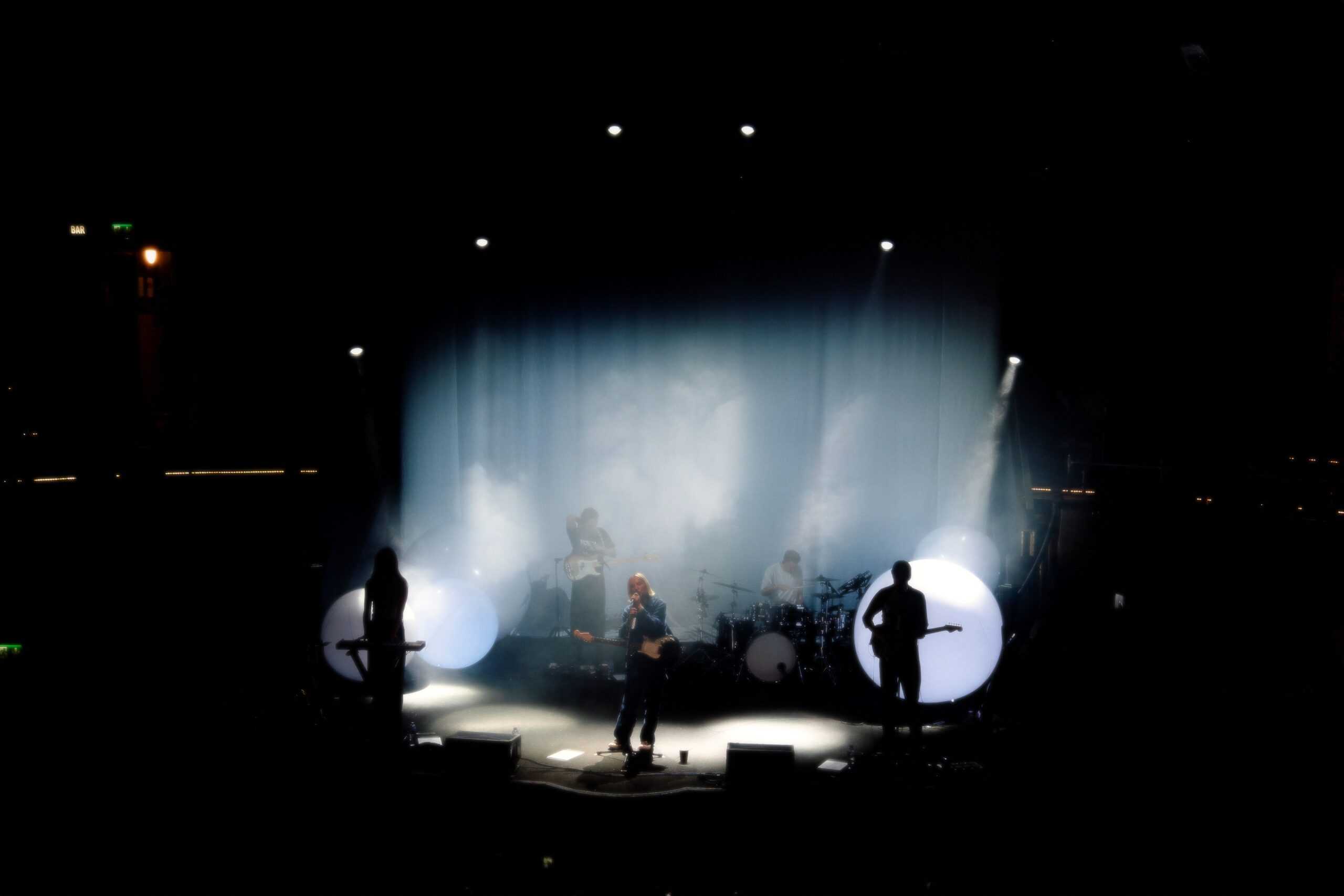
Credit: Emie Grimwood via @emiescamera (IG).
I’m an outlier, however, judging by the completely enraptured faces I see around me and near-total lack of chatter during even the slowest of numbers. It helps that she and the band have smartly arranged their setlist so that any lulls, the slow dance longing of “Over There” or the booming dirge of “Chewing Cotton Wool,” are instantly offset by a more up-tempo singalong banger – the Charli XCX-co-write “Friends” and the original EP full-band version of “Saw You in a Dream” respectively. A near-year on the road, with a fresh run of US dates still to go, have honed the band to Swiss watch levels of precision and many of the production nuances of the records don’t get lost in the live mixing. Meanwhile, the encore slot sees Bain try out a new song, “Smiley Face,” which gives off the impression she’s aware of her ascent and writing to accommodate; the track going even further on the 90s pop-rock of In the End’s big singles, like a lost Wake Up!-era Boo Radleys hit. It’s an exciting glimpse of the future.
In the now, Albert Hall marks a confident and triumphant close to an era which ends the only way it could: “Boyhood” for the main set and “Sunshine Baby” for the encore. The former’s light house throb and pleading regret getting bodies moving and hearts breaking, every lyric being sung back at full-force. The latter loses none of its golden hour melancholic power when some of its more subtle production touches – the strings, additional guitar, The 1975’s Matty Healy on backing chorus duties – have been excised, with a capacity crowd more than happy to cover the slack by taking over Healy’s harmonies at near-deafening volume. The room can barely contain it. Next time The Japanese House return to Manchester, they’ll be needing a bigger room.

![Live Review: The Japanese House – Albert Hall, Manchester [10th May 2024]](https://www.soundspheremag.com/wp-content/migration/images/stories/IMG_8905-scaled.jpeg)




